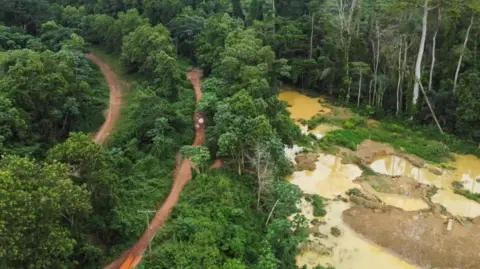 Reuters
ReutersWater from a polluted river in Ghana was so thick and discoloured that an artist was able to use it as paint to depict the environmental devastation caused by the illegal gold mining that has spread like wildfire in the resource-rich West African state.
Mercury is increasingly being used to extract gold by miners digging on a massive scale in forests and farms, degrading land and polluting rivers to such an extent that the charity WaterAid has called it “ecocide”.
“I could actually paint with the water. It was so bad,” Israel Derrick Apeti, better known as Enil Art, told the BBC.
He and his friend Jay Sterling visited the Pra River – around 200km (125 miles) west of the capital, Accra – to make a point about the environmental catastrophe unfolding because of “galamsey”.
This is the term used by locals to describe the illegal mining taking place at thousands of sites around the country – including the forested regions famous for their cocoa farms, as well as their vast gold deposits.
The West African state is the world’s sixth-biggest gold exporter, and the second-biggest cocoa exporter.
Demonstrators recently took to the streets of Accra to demand that the government take action to end the illegal mining. The police responded by detaining dozens of protesters accused of holding an illegal gathering. They were later released as anger grew over the arrests.
The hashtags #stopgalamseynow and #freethecitizens were used to galvanise young people across Ghana and the diaspora, particularly in Canada and the UK, to voice their concerns.
Apeti told the BBC that he had decided to contribute to the campaign through art.
“What is art for?” he said, adding: “On our way to the river, I just thought I could perhaps paint with the polluted water. It just came to me like that. So, we got there, I tried it and it worked out.”
Communities along the river – one of the biggest in Ghana – lamented to Apeti that the water was “once so clean that you could see the fish and crocodiles that lived in it”, but it had been transformed “into a yellowish-brown body of water”.
Ghana’s music stars have also thrown their weight behind the campaign.
Black Sherif – who hails from Konongo town in the Ashanti region, which has been badly affected by the illegal mining – stopped his set at The Tidal Rave Concert in Accra earlier this month to show a video of the devastation.
Truth Ofori, who was part of Black Sherif’s set, then sang a patriotic song called “This is our home”, while Stonebowy used his set to perform “Greedy Men”, which targeted those behind galamsey.
 Tidal Rave/Kelvin Buckman
Tidal Rave/Kelvin BuckmanThe devastation has been caused by the fact that the nature of illegal mining has changed – previously, young unemployed men dug with picks and shovels, or their bare hands, to search for gold.
They also relied on panning – the washing of sediment through a sieve so the gold settles at the bottom.
But Chinese businessmen – who first moved to Ghana around 18 years ago – have made it a more sophisticated industry.
They are accused of ignoring environmental concerns and taking to heart an age-old saying: “There is no land in Ghana which doesn’t have gold, even in the top soil. Ghana is gold.”
Indeed, during colonial times the country was known as the Gold Coast.
Some local businessmen and politicians are widely suspected to have joined them in what has been dubbed “the mad gold rush”, buying out cocoa farms and turning them into illegal mining sites.
They have also been accused of using intimidation if a farmer refuses to sell by digging up footpaths, and forcing them to eventually give up the land.
An estimated 4,726 hectares of land – more than the size of European cities like Athens and Brussels – have been destroyed in seven of the country’s 16 regions, and 34 of its 288 forest reserves, Ghana Forestry Commission head John Allotey was quoted as saying in August.
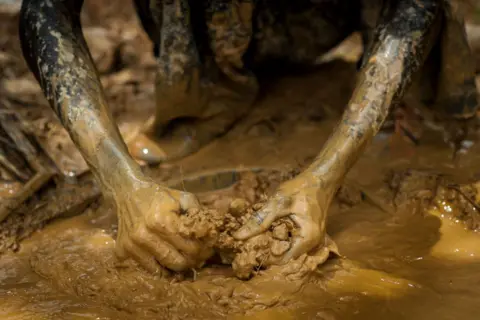 Getty Images
Getty ImagesAgricultural development consultant Dr John Manful told the BBC that “precious, valuable land” in the forest belt had been destroyed by the gold-seekers.
“Illegal small-scale mining has been taking place for decades in Ghana. However, in recent years, it has been getting out of control, having catastrophic effects,” he said.
The mining has led to the felling of trees, and the clearing of vast areas of forest vegetation. Excavators are then used to dig out the top soil and subsoil.
The soil is then deposited at gold-washing plants stationed in rivers, and water is pumped to wash the soil and crushed stones.
During the washing process, various chemicals, including mercury and cyanide, are used to help extract the gold from the soil, polluting big and small rivers.
Highlighting the dangers of this, Dr George Manful, a former senior official in Ghana’s Environmental Protection Agency, said: “Mercury can remain in water for up to 1,000 years. The water in these rivers is so turbid that it is undrinkable.”
In an interview with local broadcaster Joy FM, he also pointed out that mercury could affect the entire food chain, as it accumulates in fish and can enter crops irrigated with the water.
“We are slowly poisoning ourselves,” Dr Manful added.
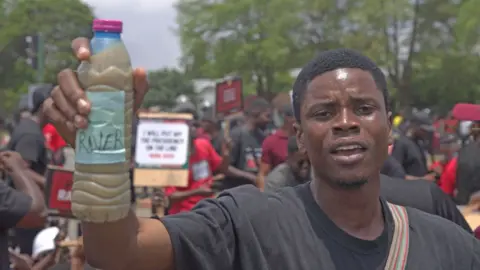
For its part, WaterAid urged the government to take “immediate action to end the ecocide”, while the state water utility warned that Ghana risked becoming an importer of water by 2030 if the illegal mining was not curbed.
In September, the government said that 76 people, including 18 foreign nationals, had been convicted of illegal mining since August 2021, and more than 850 others were being prosecuted.
The illegal mining has also affected cocoa production, with the Ghana Cocoa Board saying in 2021 that more than 19,000 hectares of farmland had been destroyed in key cocoa-growing areas like the Western and Ashanti regions.
Repeating the board’s concerns earlier this week, its chief executive Joseph Boahen Aidoo said the production of cocoa – the key ingredient of chocolate – had fallen.
“Yes, it has [taken] a toll on the industry,” he was quoted as saying by Ghana’s Chronicle news site.
The illegal mining has also affected other crops, with a rice farmer in the Ahafo region telling the BBC that she could no longer use her nearby river for irrigation purposes.
“I have to set up a whole plant that involves digging deep to find water, which is very expensive,” she said.
The farmer, who asked not to be identified, said she feared that the crisis would continue if the powerful individuals behind the illegal mining were not arrested and prosecuted.
“When I see arrests by the military in poor communities, it’s just a symbolic gesture of appearing to maintain law and order. The people making big money out of it are in offices, not on the field,” she said.
The government did not respond to a BBC request for comment.
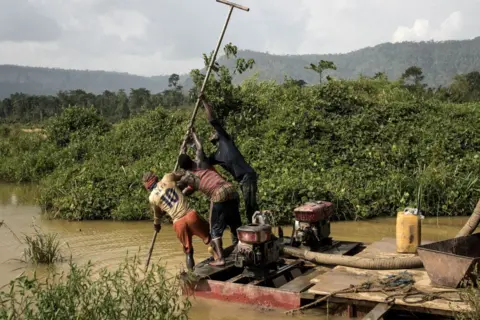 Getty Images
Getty ImagesThe gold rush has also been fuelled by the fact that the global price of the precious metal has risen to new heights, and is expected to continue doing so.
Ghana’s illegal syndicates are, therefore, boosting production.
The gold is smuggled out – possibly to countries like the United Arab Emirates, China and India – to be refined, mixed with legal gold, and sold on international markets, BBC business reporter Jewel Kiriungi told a World Service podcast that explored the topic.
The illegal industry has also boomed because Ghana, despite being resource-rich, is facing its most severe economic crisis in a generation, with unemployment worsening and the cost of living escalating.
As a result, many poor or jobless people – especially in rural areas – have either been employed by the illegal syndicates, or have simply taken up gold mining on their own, earning up to 2,000 cedis ($125; £96) a week – the average monthly salary of a teacher.
Apeti, the artist, said that when he visited the Pra River, he was told by locals that officials regularly carry out raids, destroying the equipment of miners.
“But that wouldn’t be enough to deter them from their quest for gold, as they would return at night to start mining all over again,” he said.
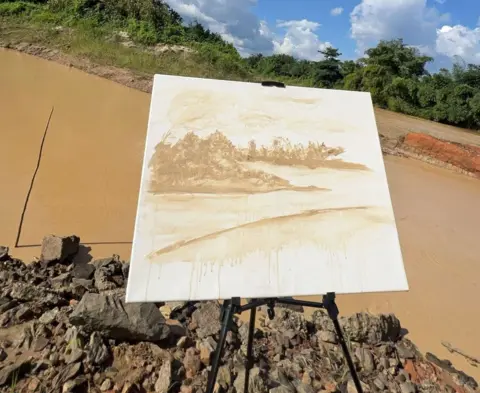 Jay Sterling
Jay SterlingAs protests took place in Accra to highlight the devastation, Ghana’s President Nana Akufo-Addo responded last week by ordering the deployment of naval boats “to ensure the immediate cessation of all mining activities, legal or illegal, in and around these water bodies”.
But some senior officials in the ruling National Peoples Party (NPP) said they did not expect a major crackdown, as many of their supporters in mining districts were involved in galamsey – and the party could not risk losing their votes in the December general election.
The popularity of galamsey was borne out by a survey conducted by WaterAid in communities involved in illegal mining in Ghana’s Upper East Region, particularly the Bongo and Bawku West districts.
More than 75% of those surveyed saw the practice as a lucrative source of income despite 97% of them acknowledging it harmed the environment and water sources.
“Alarmingly, 79% reported health issues, such as chest pains, directly linked to their work in illegal mining,” WaterAid added.
When President Akufo-Addo first took office in 2017, he acknowledged that some security personnel, businessmen and politicians were involved in galamsey.
He vowed “not just to stop it, to reclaim the land, to let our rivers work again”, but also to help “all the abled-bodied young men involved in this activity to find an alternative livelihood”.
With Akufo-Addo due to step down at the end of his two terms, his critics say that he failed to fulfil his promise and the problem rather got worse during his tenure, jeopardising – as he put it in 2017 – “the very survival of our nation”.
More BBC stories on Ghana:
 Getty Images/BBC
Getty Images/BBC
